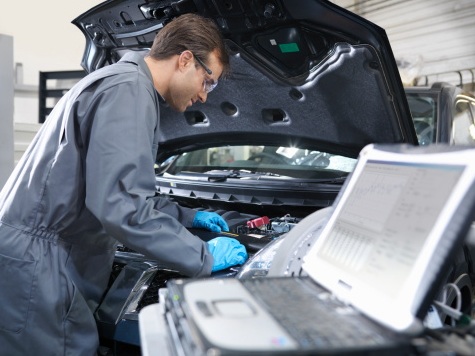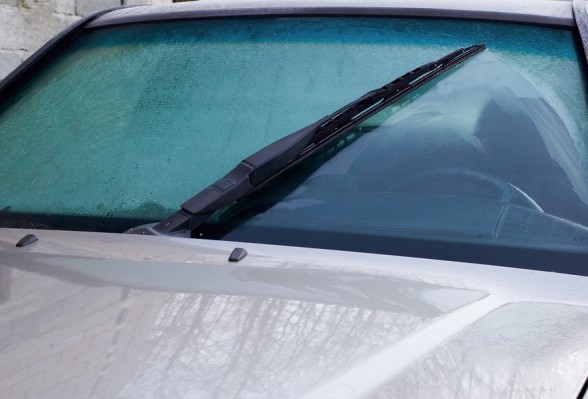Posted on 10/8/2016

Did you know that your car contains seven fluids and that, in order to keep your car running safely, you need to check all of them on a regular basis? We understand the importance of checking your fluid levels so we put together this two-part series to teach you all about the different fluids and how you can check them. Part one will look at gasoline, motor oil, and brake fluid. You’ll likely learn how to check the gasoline levels of your vehicle and put more gas in within the first week of owning the car. If you don’t then you won’t be getting very far in your second week! When you get a new car you should take a look through the owner’s manual. This manual will tell you everything you need to know including how much fuel you should keep in your car and how to check fluid levels. If you can’t find your owner’s manual then you can likely find a digital copy to download on the manufacturer’s website. You should be able to find it with a quick s ... read more
Posted on 10/8/2016

Technology these days are smarter than ever. It started with phones, then it was TVs, and now even refrigerators are “smart”. Cars are also becoming smarter. Computers these days are becoming a major feature in automobiles. Of course computers have been a part of cars for decades now, dating back to the CPU powered engine management systems (E.M.S) that became the standard in 1991. They were even in cars before then too. The CPUs in cars have always been focused on engine performance tasks and are used to regulate the air-fuel mixture, the ignition timing, idle speed and transmission shift points. Like every other kind of computer in the world these computers need to be upgraded from time to time. When a car is brand new the CPU is programmed to handle a brand new engine. Unfortunately your car engine doesn’t perform the same way it did after 100k miles. This is when you should consider having a reflash performed. A reflash is basically when the software of your car ... read more
Posted on 10/8/2016
.jpg)
The largest vehicle recall that’s ever happened took place in 1980 when the Ford Motor Company recalled 21 million cars for a fault that would cause cars to automatically switch to reverse from park. Many of these cars were not actually repaired and instead all that happened was a sticker was put on the dashboard. If you own a Ford that was made between 1966 and 1980 then your car might still have this sticker. Not every recall is as large or dangerous as this particular recall but recalls are still something you should take note of. Cars these days are ever-evolving and, as a result- are ever more complicated. As more options and features are introduced so are the chances that something will malfunction. Many recalls that happen are to address faults in similar vehicles. It’s also possible for the Federal Government to issue a recall themselves over a safety or environmental concern. If you are the original owner of a vehicle then you’ll receive a notification abou ... read more
Posted on 10/8/2016

There are three things that are certain in life; death, taxes, and that our car will get worn down. No matter how much you drive your car or where you drive it time will eventually take its toll on your car and the components keeping it running. These problems with your car can also strike at any time. It can be dust in the air, a pothole in the road, or braking too much as you drive down the highway. All of it adds up to a damaged and worn down car. That’s why we make multi-point vehicle inspections one of the services we offer. A multi-point inspection is essentially a little tender loving care for your car. There’s not much better than bringing in one of our trained and experienced service technicians take a look at your car and let you know about any problems before they can become costly repairs. They have the experience to let you know about any issue; perhaps there is a clog in your air filter that means it needs to be replaced even though you’ve not had it t ... read more
Posted on 10/3/2016

If your tires and under-inflated it can cause flat tires, blowouts, skids, and lengthen the stopping distance of your car. Unfortunately it can be hard to tell when tires are under-inflated because you might not be able to tell until they are seriously under-inflated and the pressure gets below 20lbs. Modern cars and trucks these days are often equipped with a Tire Pressure Monitoring System (TPMS). This technology has been used for years by race car drivers but only recently made its way into the wider commercial world. Race crews use this technology to nip tire pressure problems in the bud by monitoring tire pressure as a car goes around a track. Of course these TPMS aren’t free. Studies done by the US government estimate how much you can expect a TMPS system to cost; taking in to account the cost of the system itself, keeping the system maintained, replacing broken parts, and other cost increases. These costs are offset because you’ll save money on fuel and tire wear ... read more
Posted on 10/2/2016
While a used car will be brand new to you it was used by someone else before and there are many different reasons that people sell their cars. Some people sell their car because they want to get a new one, while others sell because they really want to get rid of their old one. For some people it’s a bit of both. The important thing is that you need to know what you’re getting. If a used car has a low mileage then it’s often a lease return, a corporate car, or a former rental car. If the car is so new that it still has its warranty and between 25-35k miles then this is a good sign. Even so, you still need to know how well the car was maintained. If you’re going to be sticking with a car for the long haul then you need to keep up with the maintenance so that you aren’t left paying for expensive repairs down the line. But if someone knew that they would only have the car for a few years they won’t be so interested in maintaining it. Most people can te ... read more
Posted on 9/30/2016

There’s always the possibility that a vehicle will have a design and/or manufacturing problem, no matter how well made and put together it is. If the problem is serious enough the government will order that the manufacturer issues a recall notice and fixes the problem free of charge. The manufacturer will then attempt to contact everyone who has that particular kind of vehicle so they are aware of the problem. As you can no doubt imagine this is no easy feat. A product recall always affects safety so you should always take them seriously. The good news is that it’s pretty easy to find out your car has been recalled or not. The government actually host links on their own website where you can find out including http://www.nhtsa.gov. There are also a number of other websites with this recall information on including www.carfax.com, www.autobytel.com and www.dmv.org. Recalls are always serious business but the good news is that they are also quite rare. There are also smalle ... read more
Posted on 9/28/2016

It’s important that you take care of your car in October before the temperatures drop so you can avoid being caught out in the cold and stuck with an expensive emergency repair bill. You don’t want to have your car break down in the middle of the cold winter weather. Winter makes the problems your car is having, such as hard starts and sluggish performance, that much worse. Having the car checked at the repair shop or doing all the maintenance yourself is a small investment you can make now to avoid a larger bill should your car break down during extreme weather. The following is your checklist that can help you get your car ready for the cold weather and get peace of mind. For the Heating, Wipers, and Lights Ensure that your heaters, defrosters and wipers are all working correctly Consider purchasing winter wiper blades and always use cold-weather washer fluid. Remember that you should replace the wiper blades on your car ... read more
Posted on 9/13/2016

If you were stranded in your car, would you be prepared or would your car be ready if you had to leave at a moment’s notice? In case you didn’t know September is National Preparedness Month and we would like to remind drivers of the importance of regular maintenance and do-it-yourself checks (as well as a stocked emergency kit). Make sure you check the following to make sure your car is ready for the unexpected: Tire Tread and pressure: Tire tread helps your car grip the road and having low tire tread is very dangerous when driving in wet, flood-like, snowy or icy conditions. May not be a big problem around here but driving up north may be bad with worn out tires. And did you know that if the tire pressure is too low or too high it can affect gas mileage, tread wear and vehicle performance? Check your tires regularly when they are still cold. A quick tip use the PSI (pounds per square inch) number located inside the driver door. Fluids Check ... read more
Posted on 8/19/2016

It's said that 90 percent of our driving decisions are based on visual information. Our wiper blades play an important role in this. Most Gilbert, Chandler, and Scottsdale drivers know that a dirty or streaked windshield can catch the glare of the sun or on-coming headlights and make it nearly impossible to see. Most busy car owners deal with their wiper blades from a failure perspective. They address them when they no longer function. Instead, drivers should think about wipers blades as an important safety system that they should maintain, rather than repair. And don't think that your wiper blades will last longer because you don't use them very often. Hey, they live outside in the harsh sun and freezing cold – ice and wind. They just dry out and crack over time. At Spectrum Car Care, we recommend that motorists change their wiper blades twice a year, in the spring and fall. That way you have functional blades for ... read more